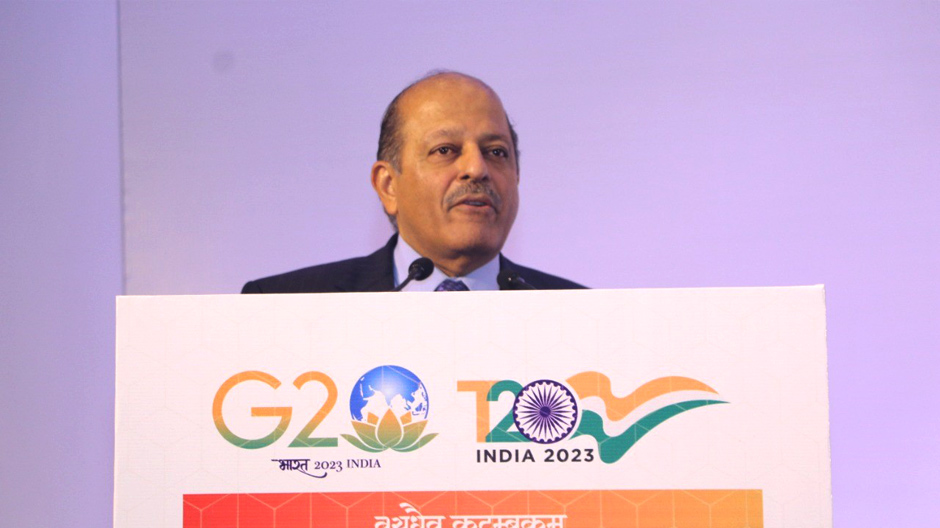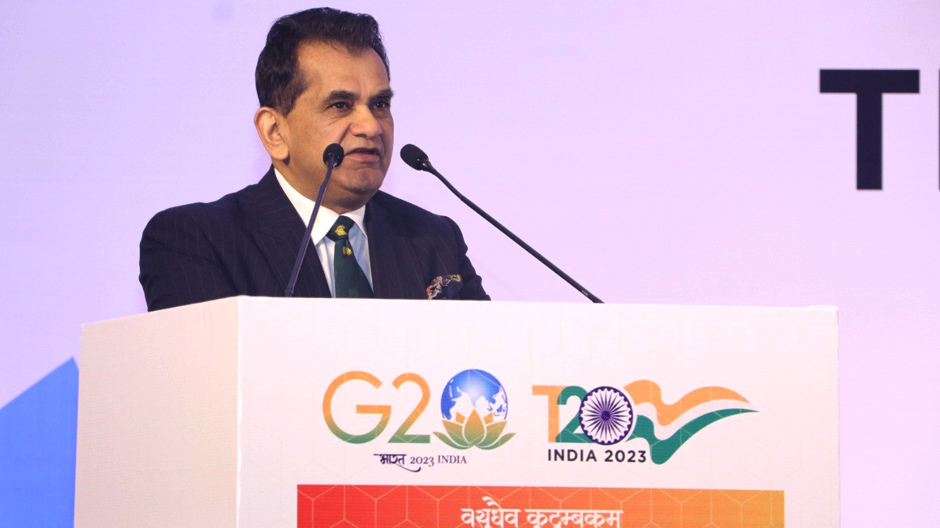- Introductory Remarks: Sujan R. Chinoy, Chair, T20 India Core Group, Chair, T20 Task Force 3 and 7, Director General, MP-IDSA
- Inaugural Address: Amitabh Kant, Sherpa, G20 India
- Vote of Thanks: Rohan Jaitley, Member, T20 India Core Group
- Hosted by: Samir Saran, Chair, T20 Secretariat; Member, T20 India Core Group, and President, ORF
The Think20 India Inception Conference laid the groundwork for what the seven Task Forces aim to achieve during India’s Presidency. It involved groups of think tanks and research institutions that are a part of the Think20 process and members of the task forces.
Dr. Samir Saran, Chair of the T20 India Secretariat and President of the Observer Research Foundation, opened the inaugural event by providing a brief overview of the Think20’s aims, goals, and functions. He addressed the gathered audience, that included over 50 international dignitaries, and discussed the events that would take place over the next two days. According to him, “the most important task before all of us is to renew the friendships, strengthen the community, and build a network of believers who believe in the importance of the G20, who see it as a useful medium to respond to the challenges that the world is confronted with, and who also see the benefits of friendships and off working together, but also enjoying together.”
Amb. Sujan R. Chinoy, Chair of the T20 India Core Group, Chair of the T20 Task Force 3 and 7, and Director General, MP-IDSA, provided the introductory remarks. He highlighted the use of popular social media accounts and stated that the work of this engagement group had got off to a “blistering start”. He emphasised the inclusion of 115 institutes from the G20 countries and the responsibility of including members from all G20 and guest countries. He emphasised the importance of inclusivity and agility as mutual goals and closed by saying, “India’s presidency is a moment for the Global South. The G20 must not speak for those outside of it, but must be empathetic to their concerns. The North and the South must forge new partnerships together.”

Shri Amitabh Kant, Sherpa, G20 India, delivered the inaugural address. He contextualised the circumstances surrounding India’s Presidency of the G20, stating that “we are meeting at a time where the world is undergoing multiple crises. Economic growth has slowed, and post-COVID impact has led to over 200 million people going below the poverty line. 100 million have lost their jobs”. He emphasised the potential of this moment by referencing the history of the G20 as a driver of radical reforms and leader of the global economy. He argued that the challenges the world faces today are an opportunity. He stated the importance of gender in India’s growth story and argued that “India cannot grow at its sustained pace with women. It is impossible to drive the world today without taking care of female nutrition, maternal health, and learning outcomes. Without women in positions of leadership, development cannot take place.” As the Indian Sherpa to the G20, he reflected on how inclusive, resilient, and sustainable growth—a global challenge—is one of India’s key priorities. He highlighted the G20’s role as the hub of global innovation and asserted that the great India narrative to its Presidency is its innovation model, one that the world can replicate. Shri Kant closed by explaining the unique position that the Think20 holds and said, “No other body, government group, or engagement group constituted is better equipped to mould India’s priorities of the G20 than the Think20. The T20 has the ability to take the G20 towards being action-oriented, decisive, and ambitious. The real brain trust of the G20 is the T20. The shaping of how India does in the G20, how it unfolds the G20 in the coming years, and how G20 is shaped will be determined by the Think20 and its intellectual inputs.”
Shri Rohan Jaitley, T20 India Core Group member, presented the Vote of Thanks. He echoed the group’s priority of inclusivity and representation and said, “We hope to have built new friendships and new bridges of creativity.” He pointed out India’s responsibility to ensure that “many get a fair hearing, unencumbered and undistracted by specific experiences.” He closed by telling the gathered audience that creating policy with a wide group of takers “should be at the centre of all our conversations, as we go through the next few months of discussions, dialogue, and conversation.”

Watch the full session here.
This event report is compiled by Sitara Srinivas, Junior Fellow, ORF.




